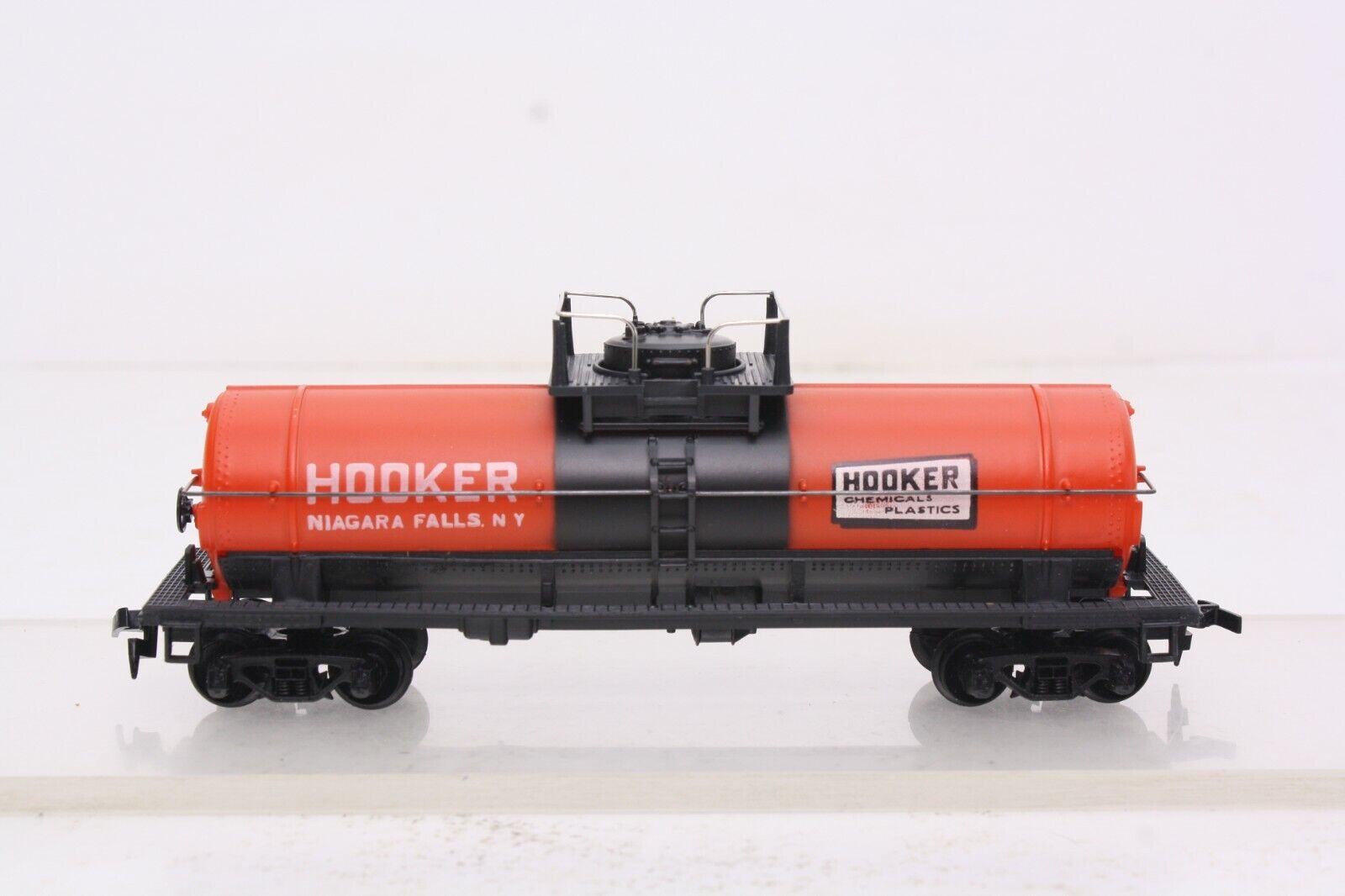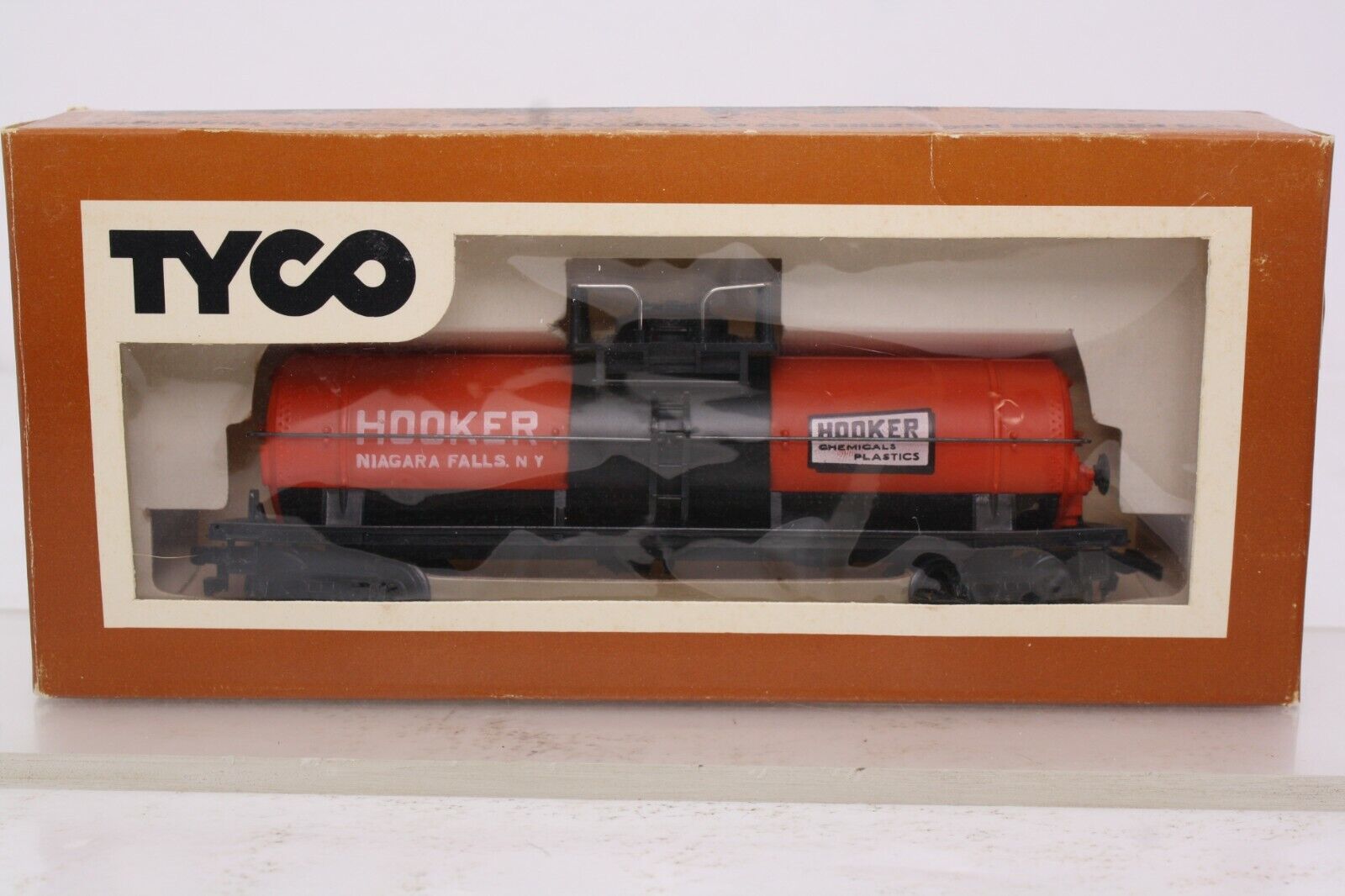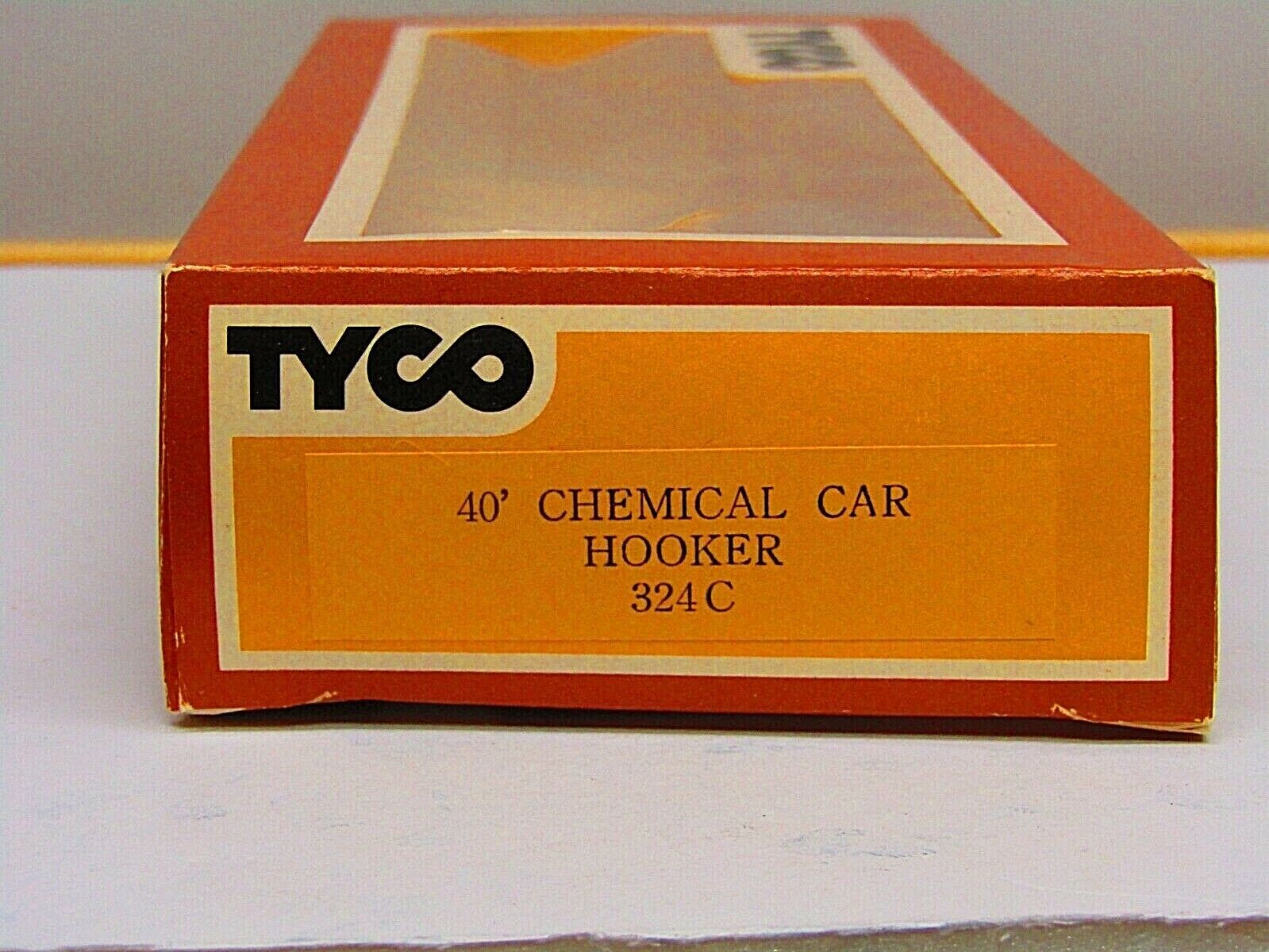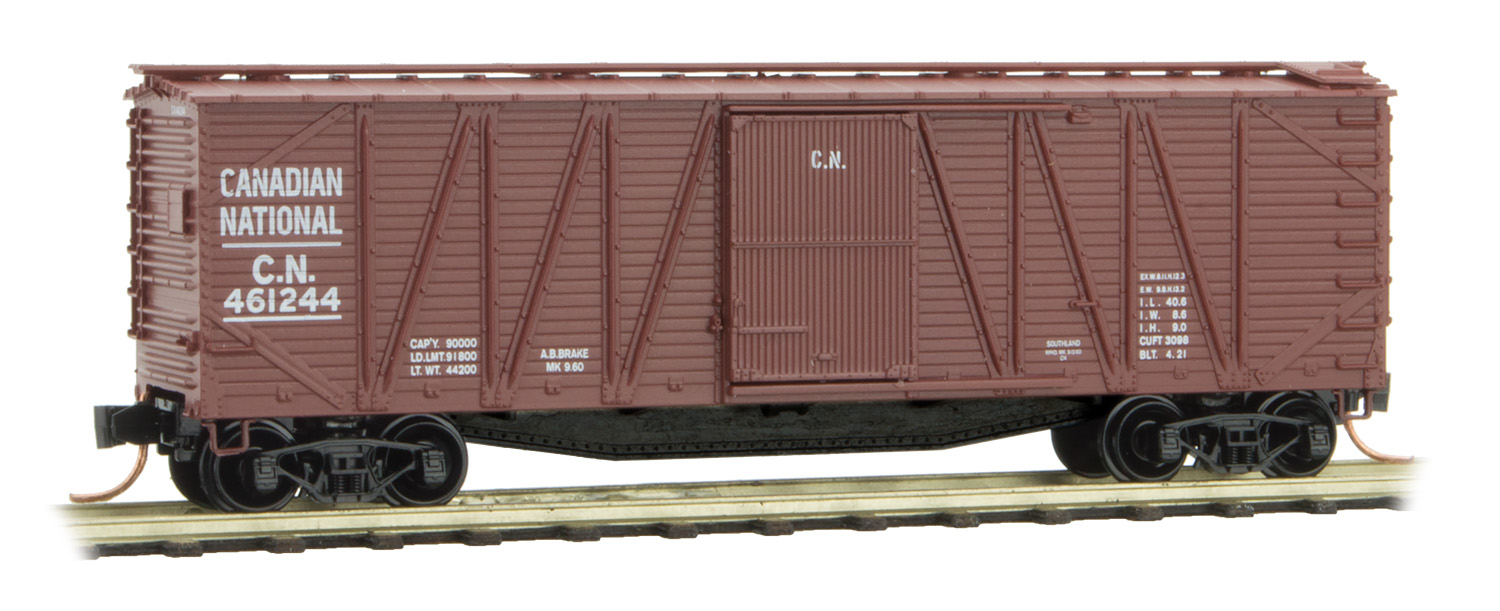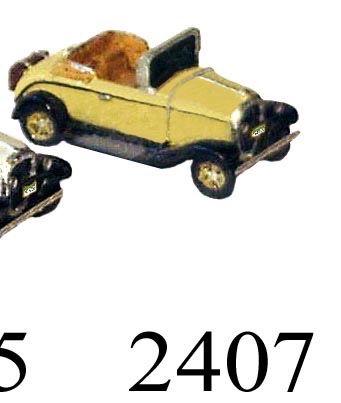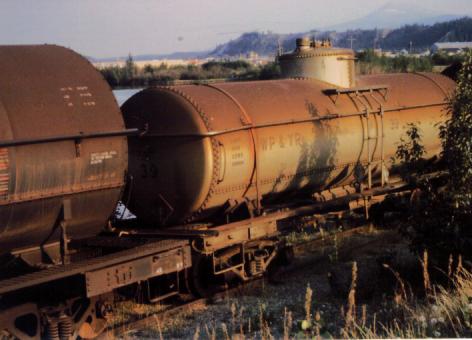Body Style Information: Sharing the same shell and underframe as TYCO's No.315 Tank Car, with a platform around the dome.
From HO-Scale Trains Resource.
From HO-Scale Trains Resource.
Prototype Information: Single Dome tank cars are a railroad staple. They have been around since the first half of the 20th century. This length car can handle about 10,000 gallons. These railcars carry a wide array of commodities, including liquid fertilizers, chemicals, fuel oils and asphalt, and food-grade oils. Tank cars can be pressurized or non-pressurized, insulated or non-insulated. Single dome cars carry only a single commodity at once. Food-service tank cars may be lined with stainless steel, glass, or plastic. Tank cars carrying dangerous goods are generally made of different types of steel, depending on the intended cargo and operating pressure. They may also be lined with rubber or coated with specialized coatings for tank protection or product purity purpose. The tank heads are also stronger to prevent ruptures during accidents.
One common version is the ACF Type 27 jacketed tank car with expansion dome which was in common use by many railroads and oil companies.
One common version is the ACF Type 27 jacketed tank car with expansion dome which was in common use by many railroads and oil companies.
Road/Company Information: 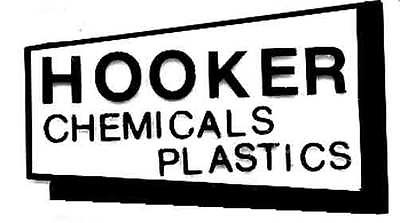 Hooker Chemical Company was an American chemical company that produced chlor-alkali products from 1903 to 1968. In 1922, Hooker bought the S. Wander & Sons company for the retail sales of lye and chlorinated lime. Hooker Chemical is best known for the chemical waste site Love Canal, which it sold in 1953, and led to a lengthy lawsuit several decades later.
Hooker Chemical Company was an American chemical company that produced chlor-alkali products from 1903 to 1968. In 1922, Hooker bought the S. Wander & Sons company for the retail sales of lye and chlorinated lime. Hooker Chemical is best known for the chemical waste site Love Canal, which it sold in 1953, and led to a lengthy lawsuit several decades later.
The company was founded in 1903 as "The Development and Funding Company" by Elon Huntington Hooker, of Rochester, NY. Hooker created a company that used the Townsend cell to elecrolyse salt into chlorine and sodium hydroxide (NaOH), also known as "caustic soda" and "lye," in a chloralkali process. Elmer Sperry, founder of Sperry Electric, and Leo Baekeland, inventor of Bakelite and Velox photographic paper consulted for Hooker to improve the design of the cell.
The company was originally sited in Niagara Falls, NY because of the low cost electricity from the Niagara Falls power project (completed in 1895), the abundance of salt from nearby mines, and availability of water from the Niagara River. However, in 1929 Hooker built a new chloralkali plant in Tacoma Washington. Hooker also owned factories in Albany, NY.
Hooker Chemical Company was purchased by Occidental Petroleum Corporation in 1968.

The company was founded in 1903 as "The Development and Funding Company" by Elon Huntington Hooker, of Rochester, NY. Hooker created a company that used the Townsend cell to elecrolyse salt into chlorine and sodium hydroxide (NaOH), also known as "caustic soda" and "lye," in a chloralkali process. Elmer Sperry, founder of Sperry Electric, and Leo Baekeland, inventor of Bakelite and Velox photographic paper consulted for Hooker to improve the design of the cell.
The company was originally sited in Niagara Falls, NY because of the low cost electricity from the Niagara Falls power project (completed in 1895), the abundance of salt from nearby mines, and availability of water from the Niagara River. However, in 1929 Hooker built a new chloralkali plant in Tacoma Washington. Hooker also owned factories in Albany, NY.
Hooker Chemical Company was purchased by Occidental Petroleum Corporation in 1968.
Brand/Importer Information: The history of TYCO trains can be traced back to John Tyler, a pioneer in HO scale who helped found the Mantua Toy & Metal Products Company in 1926 with other members of his family. They began selling trains under the Mantua name in the 1930s. Early offerings included the powerful Midjet Motor as well as a variety of rolling stock and steam locomotive kits. The shift towards “ready-to-run” (RTR) train sets after World War II led to the creation of the Tyler Manufacturing Company in 1952, better known as TYCO .
Consolidated Foods purchased TYCO in 1970, and manufacturing was shifted from New Jersey to Hong Kong. Consolidated Foods would later change its name to Sara Lee, though Norman Tyler remained as an executive with the new company. This change in ownership ushers in the “brown-box” period for collectors. Prior to 1970, TYCO offered models that reflected fairly accurate prototypes. After 1970, TYCO’s offerings wander into a fantasy world of unprototypical models.
The TYCO model railroad business was bought back by the Tyler family in 1977, who revived them under the Mantua Industries brand. Model train production by TYCO ended in the 1990s, with the final catalog appearance in 1993. The TYCO name continues as a line of radio-controlled cars produced by Mattel.
Many of the TYCO model train products were subsequently manufactured by Mantua and by International Hobby Corporation (IHC). In 2001, Mantua stopped producing its model railroad lines and sold the business to the Model Power company, which continued to sell a few items such as steam engines and freight cars under its Mantua Classics brand. In early 2014, Model Power was acquired by Model Rectifier Corporation (MRC). The company continued to make the Mantua Classics line.
Read more on HO Scale Train Resources and TYCO Brown-Box Era websites.
Consolidated Foods purchased TYCO in 1970, and manufacturing was shifted from New Jersey to Hong Kong. Consolidated Foods would later change its name to Sara Lee, though Norman Tyler remained as an executive with the new company. This change in ownership ushers in the “brown-box” period for collectors. Prior to 1970, TYCO offered models that reflected fairly accurate prototypes. After 1970, TYCO’s offerings wander into a fantasy world of unprototypical models.
The TYCO model railroad business was bought back by the Tyler family in 1977, who revived them under the Mantua Industries brand. Model train production by TYCO ended in the 1990s, with the final catalog appearance in 1993. The TYCO name continues as a line of radio-controlled cars produced by Mattel.
Many of the TYCO model train products were subsequently manufactured by Mantua and by International Hobby Corporation (IHC). In 2001, Mantua stopped producing its model railroad lines and sold the business to the Model Power company, which continued to sell a few items such as steam engines and freight cars under its Mantua Classics brand. In early 2014, Model Power was acquired by Model Rectifier Corporation (MRC). The company continued to make the Mantua Classics line.
Read more on HO Scale Train Resources and TYCO Brown-Box Era websites.
Item created by: Alain LM on 2022-05-26 05:03:47. Last edited by Alain LM on 2022-05-26 05:14:29
If you see errors or missing data in this entry, please feel free to log in and edit it. Anyone with a Gmail account can log in instantly.
If you see errors or missing data in this entry, please feel free to log in and edit it. Anyone with a Gmail account can log in instantly.


